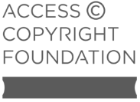-

Unless the Copyright Act is
fixed, we will all be staring
at a blank page.
Unless the Copyright Act is fixed, we will all be staring at a blank page.
Mark Lovewell | Chair of the Access Copyright Board
While I have served as an Access Copyright Board director for four years now, this is the first time I have had the pleasure of addressing you all in the Annual Report as Board Chair.
The fact that I have taken the reins of the Access Copyright Board at such a critical inflection point for the organization is not lost on me.
Access Copyright has worked relentlessly to mobilize its community of stakeholders and individual creators and publishers to push for a positive resolution to the issue of the harm caused by the ambiguity over the scope of educational fair dealing and its disastrous impact on Canadian creators and publishers.
It’s a marathon that the creative sector has been running for over a decade now.
There is no doubt that these tremendous, collective efforts were critical to obtaining the federal government’s commitment in the 2022 federal budget to repair Canada’s Copyright Act and restore a functioning marketplace for educational works. It has been rightly hailed as an important step forward. That’s why it’s all the more frustrating to note that since the tabling of the budget, no action has been taken by Ottawa to implement its promise to creators and publishers.
That adds one more year on top of an already impossibly long ten-year wait.
It’s why this important work can at times feel like it’s done in vain. The weight of the responsibility can rest heavy and I admire how so many keep mustering up the grit and determination to keep pushing the government to do what so desperately needs to be done.
In 2023, we are all preoccupied with one primary concern: creators and publishers can’t wait any longer for the government to act. More to the point, they can’t afford to wait any longer.
The royalties that Access Copyright collects and then distributes are such an important revenue stream. A study conducted a few years ago found that these royalties represented 20% of creator income and 16% of publisher profits. Since 2012, Canadian creators and publishers have been deprived of $190 million in unpaid royalties under tariffs certified by the Copyright Board of Canada. But it’s not simply a matter of dollar and cents. It really comes down to whether the government will restore the conditions necessary to ensure the continued creation of Canadian stories.
Time is of the essence. The government is on the clock.
It needs to take action now to support creators and publishers in Canada before the clock runs out.

Image credit: David Lasker
“Time is of the essence. The government is on the clock.”

Image credit: David Lasker
“Time is of the essence. The government is on the clock.”
Roanie Levy | President & CEO | Access Copyright and Prescient Innovations
When a group of Canadian creators and publishers came together to form Access Copyright (then known as CANCOPY) in 1988, they were driven by a deep sense of purpose.
It was to provide a means for creators and publishers to easily and effectively manage the reproduction rights in their work and ensure fair compensation for mass copying by multiple users, while also providing an opportunity for those who wanted to copy and share published material to be able to do it the right way quickly.
The services that Access Copyright provides are hard to encapsulate in a simple list.
We represent over 13,000 creators and over 675 publisher affiliates. We administer over 1,000 licensing agreements to license the copying of published works and, since our founding, we have distributed over $470 million to creators and publishers. But the value of our work supporting our stakeholders goes far beyond that. That’s why Access Copyright educates our affiliates and licensees about copyright law, creates new licensing models like the Read Aloud Canadian Books program when the need arises, holds webinars on new developments in Web3 and continues to work to solve the attribution problem for creative works. We also champion and uphold the rights of creators and publishers and defend those rights when necessary.
All that we do is driven by an unwavering belief in the value that our creators and publishers contribute to our culture each day, the respect that they deserve for their work and the benefits that our licensees see in our licensing services.
Almost thirty-five years now from our founding, Access Copyright’s ability to continue to serve our rightsholder and licensee communities is in peril. The future is uncertain. And with each passing day, it becomes even more so as we keep waiting for the federal government to fulfil its 2022 budget commitment “to [ensure] the Copyright Act protects all creators and copyright holders…. [and] ensure a sustainable educational publishing industry, including fair remuneration for creators and copyright holders, as well as a modern and innovative marketplace that can efficiently serve copyright users.”
But, as much as Access Copyright’s future gravely concerns me, it’s the future of Canadian stories that keeps me up at night. Because those two things are so deeply connected.
The destructive impact of the ambiguity over the scope of the education fair dealing exception, which has been in place since 2012, to Canada’s creative sector is well-known and widely documented. It is damage borne by Canadian creators and publishers that will ultimately be felt by each and every one of us: the teacher looking for the perfect book to spark their students’ imagination, the grandparent hoping to share a story to help her granddaughter learn more about who she is and the reader wishing to discover what it’s like to walk a mile in someone else’s shoes.
There is a deep and dire urgency for the federal government to take action and live up to its promise to Canadian creators and publishers. We will continue to do what we have been doing - being relentless in imploring Ottawa to do what it knows needs to be done to support Canadian creators and preserve the future of Canadian stories.

Image credit: Jennifer Rowsom Photography
“All that we do is driven by an unwavering belief in the value that our creators and publishers contribute to our culture each day, the respect that they deserve for their work and the benefits that our licensees see in our licensing services.”

Image credit: Jennifer Rowsom Photography
“All that we do is driven by an unwavering belief in the value that our creators and publishers contribute to our culture each day, the respect that they deserve for their work and the benefits that our licensees see in our licensing services.”


Champion copyrights of creators and publishersto foster a sustainable ecosystem

(from left to right): Sonya Lalli, author; Steven Mayoff, author; Molly Peacock, author and Mélissa Verreault, author.
Access Copyright’s key priority in 2022 was doubling down on its collaboration with members of the Canadian creator and publisher community to push the federal government to address the harm caused by the 2012 changes to the Copyright Act. For more than ten years now, Canadian creators and publishers have not been paid when most educational institutions outside of Quebec copy their work.
The united efforts of the creator and publisher community prompted the federal government to make a critical commitment in the 2022 federal budget “to ensure a sustainable educational publishing industry, including fair remuneration for creators and copyright holders, as well as a modern and innovative marketplace that can efficiently serve copyright users.”
HOLDING OTTAWA TO ITS COMMITMENT TO SUPPORT
CANADIAN CREATORS AND PUBLISHERS: BY THE NUMBERS
6,000,000+ views of social media and digital-advertising campaign content
49 Press hits
15,000,000+ views of press content
4,000+ signatories to The Writers’ Union of Canada Parliamentary petition
19,207 unique page views of the I Value Canadian Stories website
6,000,000+ views of social media and digital-advertising campaign content
49 Press hits
15,000,000+ views of that content
4,000+ signatories to The Writers’ Union of Canada Parliamentary petition
19,207 unique page views of the I Value Canadian Stories website
Yet, a year after the budget was introduced on April 7, 2022, no action has been taken by the federal government to fulfil this commitment.
Canadian creators and publishers can’t hold on any longer. Time is running out to save great Canadian content from disappearing.

Image credit: Association of Canadian Publishers
Minister of Canadian Heritage Pablo Rodriguez holding a blank book specially prepared by the Association of Canadian Publishers and Association nationale des éditeurs de livres to emphasize the urgency for the federal government to act on its budget commitment to Canadian creators and publishers. The text in the blank book stated “Unless we fix the Copyright Act, we will all be staring at a blank page. Together we can write a better next chapter in this story. Minister Champagne and Minister Rodriguez, the pen is in your hands.”
In the legal action brought against Access Copyright by Ontario school boards and the Ministries of Education excluding Ontario, British Columbia and Quebec, the Plaintiffs moved to strike Access Copyright’s defence and counterclaim shortly after the decision in York University v Canadian Copyright Licensing Agency (Access Copyright), 2021 SCC 32 was released. The Court dismissed the Plaintiffs’ motion on March 16, 2022, stating that Access Copyright had advanced novel arguments that deserve consideration by the Court. The merits of these arguments will be assessed by a judge of the Federal Court during a summary trial that is scheduled between October 10 and 18, 2023.
On March 30, 2022, the British Columbia Ministry of Education informed Access Copyright that it would not resume tariff payments. Access Copyright strongly disagrees with the position taken by the Ministry. Letters sent to the Ministry’s external counsel urging reconsideration of this decision have not had the desired result.
As a result of the Supreme Court decision that tariffs are not mandatory, Access Copyright has only been able to collect 4% of the $72.1 million in royalties payable under the Access Copyright Post-Secondary Educational Institution Tariff, 2011-2017. The royalties collected are scheduled to be distributed to rightsholders in 2023.

ADVANCE our products and services to adapt to our changing environment, increase value to our customers and grow distributions to our creators

Today, almost 1,100 businesses, not-for-profits, copyshops and other organizations enjoy the ease and convenience of the Access Copyright licence as a vital part of their toolbox to meet their needs for copyright-protected content. In a survey conducted in early 2022, we were pleased to discover that 76% of corporate licensees who participated responded with great satisfaction, describing our services as very or extremely satisfying.
Corporate Revenue Up in 2022 by 6.9%: An increase driven by the growth of new corporate customers. Notably, a global engineering firm based in Canada joined as an Access Copyright licensee, contributing significantly to this increase.
Building brand awareness: In 2022, we launched a new micro-site, Access for Business, dedicated to serving our corporate customers and to increase brand awareness among prospective customers through social-media advertising and other tactics.

DRIVE rightsholder-focused thought leadership and innovation with those who create, use and value content

Image credit: Pexels, RF Studio
A Patent for Attribution
In our rapidly evolving digital landscape, reliable attribution is vital to ensure that creators receive the compensation they deserve for their work, especially in the context of the ever-growing Web3 space. Prescient Innovations, Access Copyright’s innovation lab, is dedicated to exploring ways to enhance attribution and advance innovation for creators and publishers. We were thrilled to have been awarded a US Patent in July 2022 for “systems and methods for providing reliable and authoritative attribution of digital media works.” This patent represents our commitment to providing creators with the necessary tools to protect their intellectual property and succeed in today’s digital age.
Imprimo Launched
Imprimo is one of the first live use cases to address attribution through a digital service. Imprimo, which formally launched at the end of August 2022, fills a much-needed gap in the visual art ecosystem by allowing visual artists to seamlessly build a professional digital presence that promotes strong engagement and facilitates the building of attribution claims.
Artists can publicly share metadata about their creations and timestamp those claims to the blockchain, enabling them to combat misuse of their work. This unique service, which has had remarkable growth throughout 2022 and into 2023, has already helped hundreds of artists simplify their career management and improve their digital presence.
As of March 27, 2023, Imprimo has attracted over 900 users who have uploaded almost 7,000 individual pieces of artwork.
In collaboration with CARFAC, COVA-DAAV, and Regroupement des artistes en arts visuels du Québec (RAAV), Imprimo was developed by Prescient Innovations, Access Copyright’s innovation lab, with funding from the Canada Council for the Arts.
ACCESS COPYRIGHT AND PRESCIENT INNOVATIONS’ PRESIDENT & CEO HONOURED
Roanie Levy, Access Copyright and Prescient Innovation’s President & CEO was honoured with the Blockchain Leadership Award, Industry Leadership subcategory, at the Web3 and Blockchain Transformation Awards Gala on November 8, 2022.

Image Credit: Blockchain Research Institute
In 2022, Access Copyright’s revenues totalled $12.752 million, including $2.763 million in retroactive royalties collected from post-secondary institutions that had opted-in to the interim tariff for universities and colleges in order to adjust for the difference in the rates approved by the Copyright Board of Canada for the interim tariff and the final tariff certified in December 2019. These royalties will be distributed to rightsholders in 2023. These funds, offset by an unrealized loss on investments due to market performance, is the principal driver of the $1.504 million increase in Access Copyright’s revenue compared to 2021. Expenses for 2022 totalled $6.065 million, approximately $350,000 less than 2021, the result of continued prudent financial management. Despite these encouraging results, Access Copyright continued to operate at a loss. The organization distributed $6.424 million in royalties to rightsholders in 2022, a slight decrease from last year that further heightens the urgency for the federal government to act on its federal budget promise to fix Canada’s Copyright Act and restore the marketplace for educational publishing.
Charting the Impact of Fair Dealing for Education (2012-2022)*




*This chart predicts the 2022 split in domestic distributions based on the results of the 2021 publisher royalty survey.


In 2022, Access Copyright Foundation awarded $250,000 in total grant funding to 62 Canadian creators, publishers and cultural organizations that serve writers, visual artists and publishers to support the development and dissemination of publishable Canadian works in the literary and visual arts. Click here for a list of all those who were awarded a Foundation grant in 2022. The Foundation annually awards grants in three specific areas: research, professional development and events, and is an arm’s-length foundation of Access Copyright.
2022 Access Copyright Board of Directors
Mark Lovewell, Chair
Lara Caplan, Vice-Chair
Linda D. McCollum, Treasurer
Arjun Basu
Neil Harris
Sonya Lalli
Marcia Lea
Krys Ross
Eric Enno Tamm
Roanie Levy, President & CEO
Executive & Management Team
Roanie Levy, President & CEO
Michael Andrews, Chief Operating Officer
Claire Gillis, Chief Business Affairs Officer
Asma Faizi, General Counsel
JD Methot, Chief Revenue Officer
Amy Cormier, Head of Communications & Marketing
Rino Falcioni, Manager, Technology Services
Xin Ge, Manager, Accounting
Silvia Grunberg, Head of Royalties and Client Services
Joan Lewis-Milne, Head of Business Development
Stephen Sawyer, Lead, Design Research and Business Analysis
Creator Member Organizations
Canadian Artists’ Representation
Canadian Association of Professional Image Creators
Canadian Association of University Teachers
Canadian Authors Association
Canadian Society of Children’s Authors, Illustrators and Performers
Crime Writers of Canada
Federation of British Columbia Writers
League of Canadian Poets
Manitoba Writers’ Guild
Outdoor Writers of Canada
Playwrights Guild of Canada
Saskatchewan Writers’ Guild
The Writers’ Union of Canada
WritersNL (previously the Writers’ Alliance of Newfoundland and Labrador)
Writers’ Federation of New Brunswick
Writers’ Federation of Nova Scotia
Writers’ Guild of Alberta
Publisher Member Organizations
Alberta Magazine Publishers Association
Association of Book Publishers of British Columbia
Association of Canadian Publishers
Association of Canadian University Presses
Association of Manitoba Book Publishers
Atlantic Publishers Marketing Association
Book Publishers Association of Alberta
Canadian Association of Learned Journals
Canadian Publishers’ Council
Literary Press Group
Magazine Association of BC
Magazines Canada
Music Publishers Canada
News Media Canada
Ontario Book Publishers Organization
SaskBooks